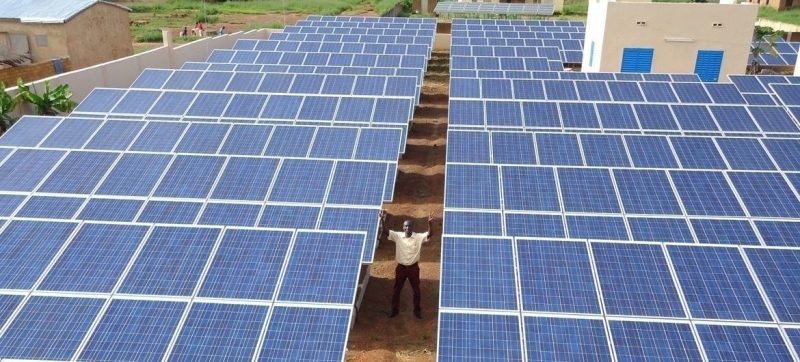- Middle East War Puts Bangladesh Jobs at Risk |
- Starmer criticises Trump, defends UK position not to allow use of its bases |
- Iran War: Nuke watchdog urges restraint amid ongoing strikes |
- 80pc tube wells in Chhatak run dry; water crisis acute |
- Advance Eid train ticket sale begins |
Finance Seen as Key to Unlocking COP30 Climate Ambition

© CIF Action — In Mali, solar panels are being used to provide electricity to communities for the first time.
Belém, Brazil — As the world turns its eyes to the Amazon, where COP30 has been underway for the past week, one question looms large: Can climate finance move from pledge to lifeline?
At every negotiation table and in every diplomatic statement lies a stark truth shared by nations on the front lines of the climate crisis: Without funding, there is no path to safety, justice, or survival.
Many urgent actions are required to secure a livable planet and protect millions of lives. But all of them — every breakthrough, every shield of resilience — depend on one essential driver: financing.
On Saturday, discussions at the UN climate change conference, formally known as the annual COPs, revolved around financial mobilization, what leaders called the engine of climate transition.
A question of survival
During the Third High-Level Ministerial Dialogue on Climate Finance, COP30 heard from representatives of nations deeply affected by climate impacts, many of whom described access to financial resources as “a matter of survival.”
UN General Assembly President Annalena Baerbock said in her opening remarks that COP30 should mark the beginning of implementing up to $1.3 trillion in annual climate finance — disbursements that “reach those most in need, quickly, transparently, and fairly.”
She stressed that climate action and social justice are “inseparable,” noting:
“Climate insecurity fuels hunger and poverty, poverty drives migration and conflict; and conflict, in turn, deepens poverty and deters investment.”
Breaking this vicious cycle, she said, is essential to delivering on global climate goals.
Renewable energy takes the lead
Reflecting on the 10th anniversary of the Paris Agreement, Ms Baerbock recalled that in 2015, many delegates had been moved to tears by the historic outcome that produced the first legally binding global climate treaty, involving more than 190 countries.
She noted that at the time, renewable energy was widely considered “unrealistic.” Today, it is the fastest-growing energy source on Earth.
In 2024, global investment in clean energy reached $2 trillion — about $800 billion more than in fossil fuels. Solar power has become the cheapest form of electricity in history.
Africa’s untapped potential
Yet Ms Baerbock warned that “vast potential remains untapped because capital is still not flowing to where it is most needed,” particularly in Africa.
More than 600 million Africans still lack access to electricity, even though the continent’s renewable energy potential is 50 times greater than the world’s projected electricity demand for 2040.
She urged developed nations to fulfil their technological and financial commitments and to advance reforms of global financial institutions.
The ‘lifeblood’ of climate action
UN Climate Change Executive Secretary Simon Stiell also addressed the meeting, underscoring the transformative power of climate finance.
He described finance as the “lifeblood of climate action,” capable of turning “plans into progress” and “ambition into implementation.”
Mr Stiell stressed that the most vulnerable countries continue to face major challenges in accessing funds that have long been pledged.
‘When finance flows, ambition grows’
Despite billions invested worldwide in clean energy, resilience and just transitions, Mr Stiell said the total volume remains “neither sufficient nor predictable enough,” and not equitably shared.
At COP30, the world is looking for proof that climate cooperation delivers.
“Real finance, flowing fast and fair, is central to that proof,” he said, urging delegates to demonstrate not only that climate cooperation is working, but that investments made now can shape the “growth story of the 21st century.”
The UN climate chief emphasized:
“When finance flows, ambition grows,”
enabling implementation that creates jobs, lowers the cost of living, improves health outcomes, protects communities, and secures a more resilient, prosperous planet for all.

